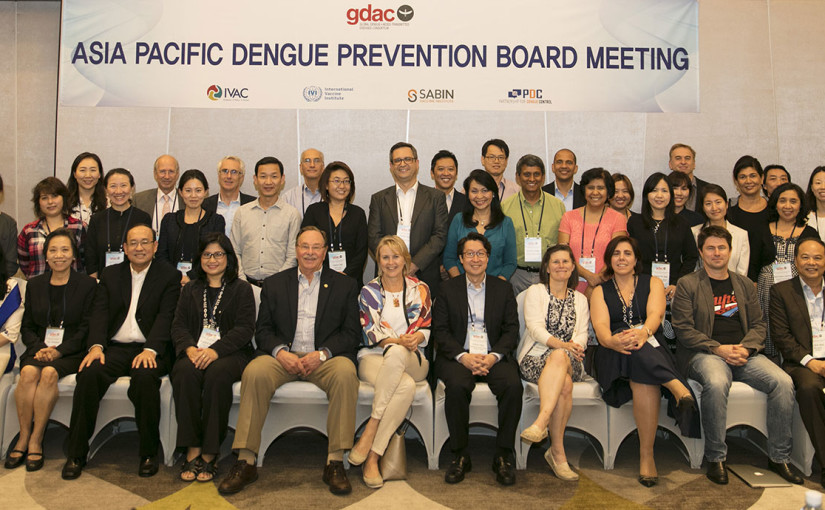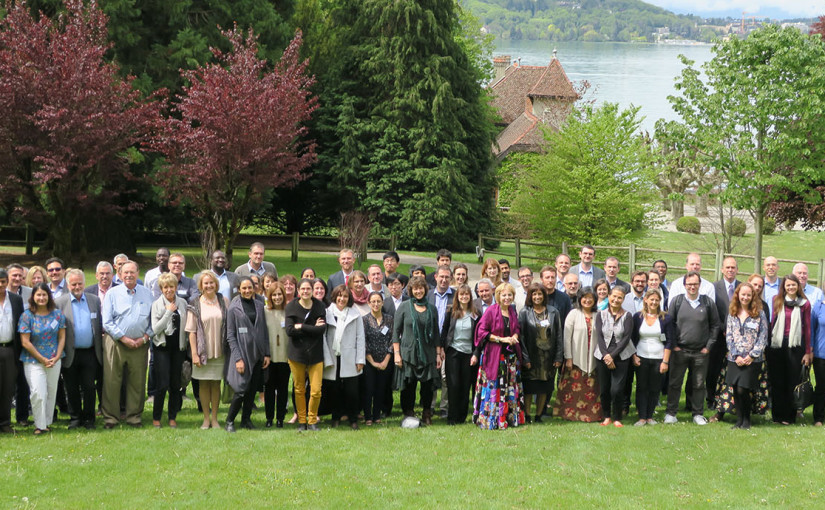Today, four leading institutions at the forefront of dengue prevention and control—the International Vaccine Institute (IVI), the International Vaccine Access Center (IVAC) of the Johns Hopkins University, the Partnership for Dengue Control Foundation (PDC) and the Sabin Vaccine Institute—announced a new global alliance to integrate approaches to fight dengue and other Aedes-transmitted diseases under one strategic umbrella.
Named the Global Dengue and Aedes-transmitted Diseases Consortium (GDAC), this new partnership will expand its expertise in dengue to other Aedes-transmitted diseases including Zika, chikungunya and yellow fever, responding to the urgent need for coordination in the currently fragmented efforts to control the diseases transmitted by one of the world’s most dangerous animals—the Aedes mosquito.
“Dengue has emerged as one of the most important infectious diseases over the past 40 years, today infecting 400 million people worldwide each year in over 100 countries. Efforts to reverse this trend have fallen short for many reasons, but limited funding, lack of effective tools, and fragmented leadership have been among the most important” said Dr. In-Kyu Yoon, Deputy Director General of Science at the International Vaccine Institute and now Director of GDAC. “Other rapidly spreading Aedes-borne infections such as Zika and chikungunya remind us that Aedes-transmitted diseases will continue to spread as irreversible global trends such as population growth, urbanization and globalization continue to provide the ideal conditions to promote the spread of these diseases. We need a global, unified strategy to prevent and control known and as yet unknown Aedes-transmitted diseases.”
Today we are entering a new era in the fight against dengue and other Aedes-transmitted diseases, with the recent licensure of the first dengue vaccine and recent innovations in mosquito control and diagnostics. Many of these new technologies will become available for use in the next three to five years, but when used alone none will be as effective as when they are used in combination. GDAC proposes the use of these methods in combination to substantially decrease transmission and prevention of major epidemics of dengue and other Aedes-transmitted viruses.
Working closely with the World Health Organization (WHO), GDAC will provide scientific evidence to facilitate comprehensive Aedes-transmitted disease control, incorporating research and public health projects, technical meetings and consultancies, regulatory and policy support, financing frameworks and communications and advocacy. GDAC’s key objectives are to accelerate innovation and application of vaccines, vector control, antivirals, clinical management, therapeutics, diagnostics and surveillance, and licensure and post-marketing oversight of vaccines. GDAC will also focus on strengthening social mobilization, advocacy and capacity building. It will continue its members’ work with vaccine early adopter countries to develop integrated control strategies specific to those countries. GDAC will work with all stakeholders to develop strategies designed to prevent outbreaks caused by other viruses transmitted by Aedes mosquitoes.
“We propose to provide the leadership for integrated program implementation under one umbrella, working closely with the WHO and international funders, to reverse the trend of expanding epidemic dengue and other Aedes-transmitted viruses as public health problems” said Prof. Duane J Gubler, Chairperson of GDAC and Prof. Emeritus of the Program in Emerging Infectious Diseases, Duke-NUS Medical School. While much has been achieved in the past decade in developing new tools, it is unlikely that any of these new tools will be successful in controlling these diseases when used alone. Success will largely depend on integration of tools, effective partnerships, and coordinated leadership in program implementation. Our collective efforts are essential to eliminating the Aedes-mosquito as a public health threat worldwide.”
GDAC brings together the Dengue Vaccine Initiative (DVI) and the Partnership for Dengue Control (PDC). Established in 2011 by IVI, IVAC, Sabin and the WHO, DVI focused on accelerating the development and introduction of safe and protective dengue vaccines into public-sector programs, especially for the poor, stimulating the development of safe and effective dengue vaccines. PDC was created in 2013 by a group of international dengue and public health experts to build synergies among exciting new tools in the development pipeline. Hosted by Fondation Mérieux, its mission is to promote development and implementation of innovative integrated approaches for the prevention and control of dengue.
Now as GDAC, the four partners will combine their expertise across major spheres within global health, including epidemiology, health economics, advocacy and communication and surveillance. With a global presence, spanning Asia, America and Europe, they will build a common agenda to lead the new era for Aedes-transmitted diseases prevention and control.
About the International Vaccine Institute
The International Vaccine Institute (IVI) is an international organization devoted to developing and introducing new and improved vaccines to protect the world’s poorest people, especially children in developing countries. Established in 1997, IVI operates as an independent international organization under a treaty signed by 35 countries and the World Health Organization. The Institute conducts activities in more than 20 countries of Asia, Africa and Latin America on vaccines against a variety of diseases, and develops new and improved vaccines at its headquarters in Seoul, Republic of Korea. For more information, please visit http://www.ivi.int.
About the International Vaccine Access Center
The International Vaccine Access Center (IVAC) aims to accelerate equitable and sustainable access to vaccines through the generation, synthesis, and use of evidence to inform decision making and action. IVAC accomplishes this by drawing upon expertise from the Johns Hopkins Bloomberg School of Public Health faculty and partners. IVAC works to build knowledge about the value of vaccines to help support strong immunization programs through targeted, policy-focused research and practice in areas such as disease burden, cost-effectiveness, vaccine policy, financing, demand forecasting and disease epidemiology. For more information, please visit www.jhsph.edu/ivac.
About the Sabin Vaccine Institute
The Sabin Vaccine Institute (Sabin) is a non-profit, 501(c)(3) organization of scientists, researchers and advocates dedicated to reducing needless human suffering from vaccine-preventable and neglected tropical diseases (NTDs). Since its founding in 1993 in honor of Dr. Albert B. Sabin, the developer of the oral polio vaccine, Sabin has been at the forefront of global efforts to eliminate, prevent and cure infectious and neglected diseases. Sabin develops new vaccines, advocates for increased use of existing vaccines and promotes expanded access to affordable medical treatments in collaboration with governments, academic institutions, scientists, medical professionals and other non-profit organizations. For more information, please visit www.sabin.org.
About the Partnership for Dengue Control Foundation
The Partnership for Dengue Control (PDC) was created in 2013 to spearhead an integrated approach to sustainably control and prevent dengue. As a non-profit foundation, it brings together leading experts in the dengue-prevention community from different fields to address key issues, with an emphasis on combining vector control and vaccination strategies. PDC seeks to build synergies among the many new and innovative tools in the development pipeline. Its unique approach is developed through workshops, multidisciplinary task forces, research agenda, advocacy and other initiatives. Hosted by Fondation Mérieux, PDC is led by an independent board with Prof. Thomas W. Scott as chairman and Prof. Annelies Wilder-Smith as director. They replace PDC’s founding chairman, Prof. Duane Gubler, and founding director, Dr. Rémy Teyssou, who both continue on the PDC Foundation board. For more information, please visit: www.gdac-dengue.org.
Media Contact
Rebecca Van Roy
Program Officer, Vaccine Advocacy and Education
Sabin Vaccine Institute
Email: rebecca.vanroy@sabin.org
Tel: +1 (202) 683-1880



